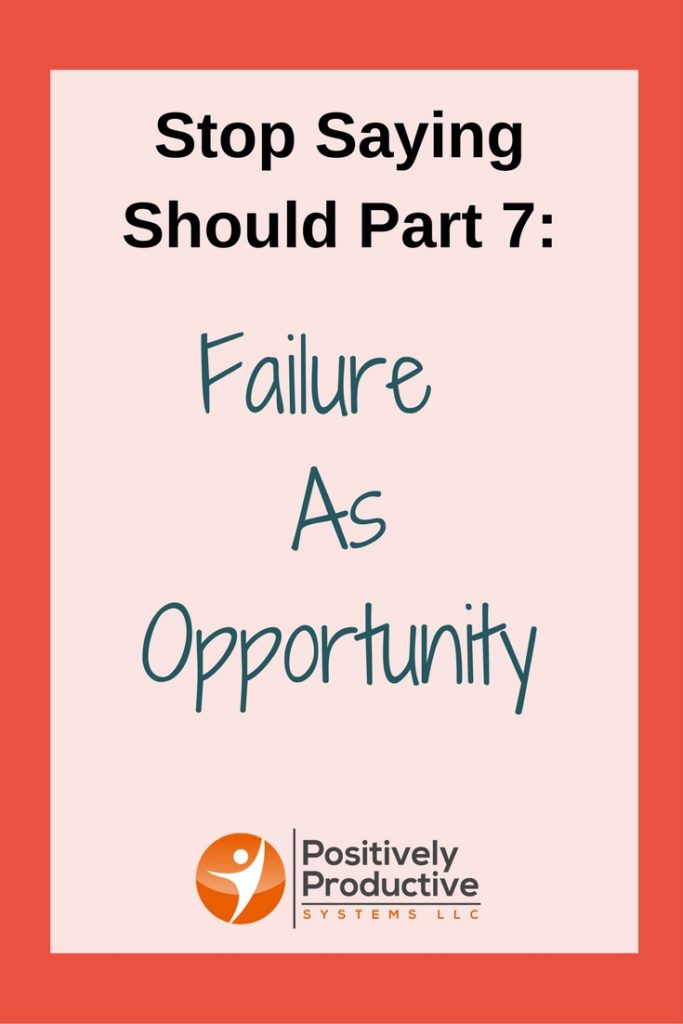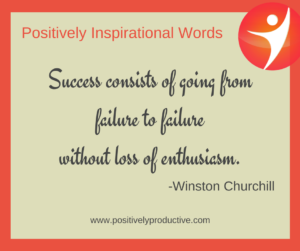“Failure is simply the opportunity to begin again, this time more intelligently.” -Henry Ford
 I’ve wanted to write this blog for awhile now. How long? It’s almost embarrassing to say, really. It’s also hard to say since I’ve lost track of time. I knew I wanted to write about this topic. It’s the last in a set from my “Stop Saying Should” series of blogs I’ve been writing based on my list of the 7 things we do to sabotage ourselves.
I’ve wanted to write this blog for awhile now. How long? It’s almost embarrassing to say, really. It’s also hard to say since I’ve lost track of time. I knew I wanted to write about this topic. It’s the last in a set from my “Stop Saying Should” series of blogs I’ve been writing based on my list of the 7 things we do to sabotage ourselves.
It is an important topic that I wanted to share. And I have certainly shared it in coaching sessions and posts and comments and conversations along the way. But I hadn’t gotten to the blog post.
Why? Well, you know life. It’s what happens while we’re making other plans, right? I often say Life “lifes” you. And that is a fact. But I believe what really happens is we continually reprioritize our lists and it was more important to me to connect personally to people over the last month than to write. And now it’s time for the message so I am making the time to share it this way.
I must admit to the irony of feeling like I failed my blog when I didn’t post for awhile. Has that ever happened to you? You have these plans and then something completely changes. You must stop or quit and your first instinct is to feel like you failed. I do it too. It’s natural, but I’m here to tell you that perspective and context are critical, not to mention a simple-to-ask-but-hard-to-answer question of what failure is anyhow.
CONTEXT MATTERS
 I could look at the article I didn’t do and focus on that with frustration, or I could consider what I’ve been doing instead. SO much has happened during this time.
I could look at the article I didn’t do and focus on that with frustration, or I could consider what I’ve been doing instead. SO much has happened during this time.
I’ve been taking on new clients, renewing contracts, and doing some special on-site organizing intensives to help clients enter the holiday season. I’ve hosted a Vision Board workshop and presented at Wellness Nights. I’ve had some amazing family visits, events, and a lovely Thanksgiving holiday with my family. I’ve also walked my own talk by organizing a portion of my home that was sorely in need of it.
My focus lately has been on personal connections. I’ve had a tremendous number of “coffee chats” (in-person and by video chat). (Did you know you can book your own if you’d like to chat with me?) I’ve posted on Facebook and Instagram daily with inspiration and ideas. And I also hosted an incredibly successful gratitude series (free coaching and community designed to help members explore gratitude and create personalized rituals). Watch for the next one in February 2018!
As if that’s not enough, I was also part of a number of online summits and interviewed for multiple podcasts. I’ll be sure to keep you posted when they go live! My point in all this? Context. I didn’t simply NOT write a blog. I shared my message elsewhere.
REDEFINING FAILURE

Looking at the official definition of failure, there are many disconcerting words used like “lack of success”, “non-fulfillment”, “defeat”, and “negligence”. These may be accurate, but there is more to it than that. When you think about what failure really is, it’s not just not getting something right, it’s an opportunity to figure out what doesn’t work.
“I have not failed. I’ve just found 10,000 ways that won’t work.” –Thomas A. Edison
LEARNING TO FAIL
So when something in our lives goes off the rails, what’s the better choice: wallow in what didn’t work, or use the clues to move forward? That’s a trick question of course. It’s the whole point of this article!
Many times when we don’t attend to something, something doesn’t work for us, or we just don’t get it right, it’s a sign of something deeper. It’s not always about US. There are so many possible reasons – we didn’t learn something properly, we accepted the task without fully understanding what was needed, other parts of life took precedence. If we look carefully, failure becomes a lesson – a result that offers us clues for a better result.
No spoiler alert needed, but in Star Wars: The Last Jedi, Yoda offers this quote: “Failure, our greatest teacher is.” Word order notwithstanding, I nearly applauded right in the theater when I heard that. I contained myself and instead I chose the ever mature approach of nudging my son enthusiastically with a quiet, yet firm reminder that his mom constantly says this very thing.
IT’S NOT ABOUT YOU
 Mistakes are important guideposts on our path, yet we are far too inclined to give them unnecessary value and allow them to negatively dictate our self worth. Instead, why not consider them with a detached view like scientists? I’m not saying ignore your culpability, but rather learn what would work better.
Mistakes are important guideposts on our path, yet we are far too inclined to give them unnecessary value and allow them to negatively dictate our self worth. Instead, why not consider them with a detached view like scientists? I’m not saying ignore your culpability, but rather learn what would work better.
What went wrong? If you screwed up, own that and then figure out how to fix it for next time. Sometimes that means not promising the same thing. Sometimes it means changing the parameters. Sometimes it means trying again with a better understanding of what is needed.
Every situation is different. Every failure is an opportunity.
About the STOP SAYING SHOULD SERIES
In the Stop Saying Should Series, I’m focusing on a list of 7 items that sabotage our happiness and productivity. These are things like saying “should” and comparing ourselves and our lives to others, as well as skipping the self-care and assuming what others think. The full collection can be found in this free inspiration sheet, but I believe each one deserves its own spotlight, so I’m dedicating this series to that.
Through my own development and my experiences with clients, I’ve found negative self-talk to be a mindset killer. Even for those who are positive and determined, how they treat themselves and perceive things can be a silent threat that sabotages all they are trying to do. That is why I wrote “Stop Saying Should” and how the list flowed freely from me. It started with that simple, but potent, phrase.
- Stop Saying Should Series Part 6: Don’t You Dare Skip the Self-Care
- Stop Saying Should Series Part 5: It’s Your Story, Make It A Good One
- Stop Saying Should Series Part 4: Assumption Junction What’s Your Function
- Stop Saying Should Series Part 3: Compare and Despair, Don’t Go There
- Stop Saying Should Series Part 2 of 8: Skip the Should, Find Your Why
- Stop Saying Should Part 1: Mental Decluttering and Mindset Shift









I am gradually reducing clutter and getting rid of “things”
Hopefully, by the time I kick the bucket, the house will be much more simple and there will be far fewer things that those left behind will have to go through!